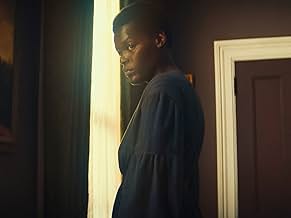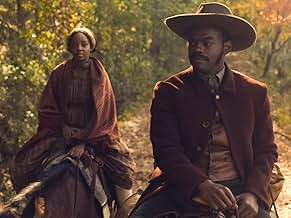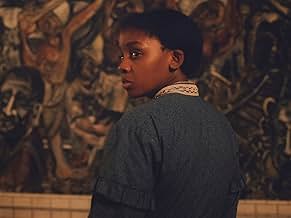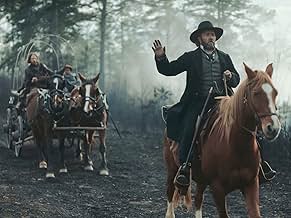The Underground Railroad: Os Caminhos para a Liberdade
Título original: The Underground Railroad
Uma jovem chamada Cora faz uma descoberta surpreendente durante sua tentativa de se libertar da escravidão no Sul.Uma jovem chamada Cora faz uma descoberta surpreendente durante sua tentativa de se libertar da escravidão no Sul.Uma jovem chamada Cora faz uma descoberta surpreendente durante sua tentativa de se libertar da escravidão no Sul.
- Indicado para 7 Primetime Emmys
- 15 vitórias e 68 indicações no total
Explorar episódios
Enredo
Você sabia?
- CuriosidadesThe "Underground Railroad" as a train/railroad had never really existed. That name describes a network of secret routes and safe houses during the 19th century across the Eastern Seaboard of the United States of America. The "railroad" helped enslaved African Americans to escape the Northern states, and, after the Fugitive Slave Act, to Canada. The first literal subway/tube/underground railroad was built in London, England, in 1863, while America was embroiled in the Civil War to end slavery.
- ConexõesFeatured in Late Night with Seth Meyers: Joel Edgerton/Edward-Isaac Dovere (2021)
Avaliação em destaque
When I read Colson Whitehead's "Underground Railroad" book, I was impressed by the author's ability to capture the essence--both physically and emotionally--of the institution of slavery in the United States. Unfortunately, this Barry Jenkins TV adaptation didn't do nearly as much of that for me.
For a very basic overview, "The Underground Railroad" tells the story of Cora (Thuso Mbedu), a young woman slave who escapes her Georgia plantation via the help of the Underground Railroad of yore. But in this story, the locomotive is literal as opposed to metaphorical. While continuing to head towards free country, Cora makes numerous stops in varying locales, experiencing the different ways in which African-Americans are treated. All the while, she is pursued by Ridgeway (Joel Edgerton), a slave bounty-hunter with a complicated past of his own.
From a production value standpoint, there isn't much wrong with "Underground Railroad". It clearly takes it mission very seriously (almost too seriously, in all honesty) and puts to the screen a gritty, realistic vision of Cora's life and times. In other words, I see where a supreme effort was made by all involved to elevate this to classic status.
But as I hinted, it also seemed like everything here was trying "a bit too hard", so to speak. To the point where I never felt like I emotionally connected with much of the material. For example...
-The acting seems fine, in a technical sense, but it never once "goes for the throat" in terms of really trying to make a point or punctuate an emotion. It almost exclusively tries to rely on the visuals and realism of the scenes playing out.
-Cora's journey is supposed to be broad and intriguing, but here it feels disjointed and scattered. Her time with Caesar (Aaron Pierre) and her time with Royal (William Jackson Harper) are indeed unique, but I never saw--in the end--how they dovetailed with each other.
-A decent amount of time is spent giving Ridgeway a daddy-issues (played by Peter Mullan) backstory, and theoretically that should all work. But the slave-catcher's deeds are so despicable and maniacal that I found it difficult to feel for him on any level other than "villain of the piece".
-A plot thread involving Cora's mother Mabel (Sheila Atim) is used to end the proceedings, and fell completely flat for me. This was clearly supposed to provide the emotional end-punch of the whole series, but again more just muddied the waters for this viewer.
About halfway through "Underground Railroad", I had it pegged as 7/10 stars. But after that point, it had little further ground to trod and the endgame didn't compel me to put all the emotional pieces together (hence the middling 5/10 final rating land).
Of course, I'll always wonder if "Underground Railroad" would have hit different for all viewers had it not debuted during the teeth of a global pandemic. This is a miniseries that doesn't go down easily from a physical or emotional perspective, and perhaps a weary nation wasn't in the mood for such a thing. All told, this is one that ultimately didn't have much of an impact on me one way or the other.
For a very basic overview, "The Underground Railroad" tells the story of Cora (Thuso Mbedu), a young woman slave who escapes her Georgia plantation via the help of the Underground Railroad of yore. But in this story, the locomotive is literal as opposed to metaphorical. While continuing to head towards free country, Cora makes numerous stops in varying locales, experiencing the different ways in which African-Americans are treated. All the while, she is pursued by Ridgeway (Joel Edgerton), a slave bounty-hunter with a complicated past of his own.
From a production value standpoint, there isn't much wrong with "Underground Railroad". It clearly takes it mission very seriously (almost too seriously, in all honesty) and puts to the screen a gritty, realistic vision of Cora's life and times. In other words, I see where a supreme effort was made by all involved to elevate this to classic status.
But as I hinted, it also seemed like everything here was trying "a bit too hard", so to speak. To the point where I never felt like I emotionally connected with much of the material. For example...
-The acting seems fine, in a technical sense, but it never once "goes for the throat" in terms of really trying to make a point or punctuate an emotion. It almost exclusively tries to rely on the visuals and realism of the scenes playing out.
-Cora's journey is supposed to be broad and intriguing, but here it feels disjointed and scattered. Her time with Caesar (Aaron Pierre) and her time with Royal (William Jackson Harper) are indeed unique, but I never saw--in the end--how they dovetailed with each other.
-A decent amount of time is spent giving Ridgeway a daddy-issues (played by Peter Mullan) backstory, and theoretically that should all work. But the slave-catcher's deeds are so despicable and maniacal that I found it difficult to feel for him on any level other than "villain of the piece".
-A plot thread involving Cora's mother Mabel (Sheila Atim) is used to end the proceedings, and fell completely flat for me. This was clearly supposed to provide the emotional end-punch of the whole series, but again more just muddied the waters for this viewer.
About halfway through "Underground Railroad", I had it pegged as 7/10 stars. But after that point, it had little further ground to trod and the endgame didn't compel me to put all the emotional pieces together (hence the middling 5/10 final rating land).
Of course, I'll always wonder if "Underground Railroad" would have hit different for all viewers had it not debuted during the teeth of a global pandemic. This is a miniseries that doesn't go down easily from a physical or emotional perspective, and perhaps a weary nation wasn't in the mood for such a thing. All told, this is one that ultimately didn't have much of an impact on me one way or the other.
- zkonedog
- 16 de jan. de 2022
- Link permanente
Principais escolhas
Faça login para avaliar e ver a lista de recomendações personalizadas
- How many seasons does The Underground Railroad have?Fornecido pela Alexa
Detalhes
- Data de lançamento
- Países de origem
- Idioma
- Também conhecido como
- The Underground Railroad
- Locações de filme
- Empresas de produção
- Consulte mais créditos da empresa na IMDbPro
- Tempo de duração59 minutos
- Cor
- Mixagem de som
- Proporção
- 1.78 : 1
Contribua para esta página
Sugerir uma alteração ou adicionar conteúdo ausente










































